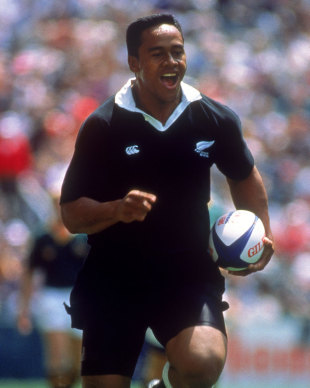|
HSBC Sevens World Series
Sevens must remain a development tool
John Taylor
May 11, 2012

All Blacks legend Jonah Lomu used the 7s stage as a springboard to greatness
© Getty Images
Enlarge
In days of yore the season would now be over. It would have finished last Saturday with the Middlesex Sevens at Twickenham where a host of internationals would have been the star turns at a grand party played out in front of 60,000 plus spectators. This coming weekend the final leg of the HSBC World Sevens Series is expected to attract the biggest crowd since those halcyon days - maybe as many as 100,000 over the two days - but it will be a very different occasion. Sevens was always fun for the spectators and hell for the players but now it is big business and some people - Stephen Jones, The Sunday Times' rugby correspondent, for example - are worried it is becoming too high profile and argue it could overtake the 15-a-side game in importance. They point to the surge in interest and funding in the developing countries since it was announced that Sevens will be included as a new sport for the 2016 Olympic Games in Brazil. I believe their concerns are exaggerated but there are trends that need addressing. It is certainly true that small nations (in every sense of the word) who cannot hope to compete at 15s can quickly make a mark in the shortened version of the game. It is fast, exciting, simple to understand and ideal for the Olympics because you can complete a tournament in two days. That makes it a great vehicle for popularising the game. As rugby seeks to become truly global it is good news and as long as it is used as a stepping stone to the real thing - funding from the IRB depends on full 15s and Sevens programmes - I see no problem. However, I have a massive problem with the way Sevens is becoming separated from the mainstream in the most developed rugby nations - England being a prime example. Sevens used to be a really important development tool for the big countries. I spent several seasons covering the World Series for ITV and it was great to see the way they used the tournaments to improve the skills of young players destined to become full internationals. The first time Lote Tuqiri wore a Wallabies jersey after his switch from rugby league was at Brisbane - he scored some great tries but then cost Australia the tournament. The young Liam Messam made his Sevens debut whilst still at school before going on to become a full All Black, Ben Foden was not much older and Matthew Tait was nursed back to confidence in 2006-07 after his traumatic international debut against Wales in 2005. That could never happen now because Sevens training is incredibly specialised and incompatible with 15s. Coaches in the two disciplines are pulling in different directions so players are being forced to choose between Sevens and 15s early in their careers - something I believe is detrimental to the game and the players concerned.
In England this has now been formalised to the point where most of the Sevens squad have central contracts with the RFU. This was partly because clubs, quite understandably, found losing their international Sevens players for 12 weeks every season to play in the World Series too disruptive but it was also because the training they received whilst seconded to the England Sevens squad made them useless for the 15-a-side game. In the end they refused to give them new contracts. England are not alone. I know of a young Welsh player whose coaches at Newport Gwent Dragons put him on a training programme to bulk-up who was immediately told to lose three kilos when he joined the Sevens squad. Ben Ryan, the England Sevens coach, is quite dismissive of those who talk about Sevens as a development tool - for him it is a separate sport. His job is to produce the best possible Seven so I understand his reasons but I believe that philosophy is short-sighted and dangerous. Sevens will always turn-up a few specialists - players who are just ideally suited to the game like Fiji's Waisale Serevi and England's Ben Gollings, who holds the all-time points scoring record in World Series tournaments by a mile - but the reality is that they both failed at the highest level in 15s. The IOC is expecting to see the best rugby players in the world in Rio de Janeiro in 2016, not a bunch of players nobody has heard of, and the IRB must be aware that rugby will be on trial. It has been a long fight to join the Olympic family but there is no guarantee they will be there forever. It was seeing world stars such as David Campese and Jonah Lomu strutting their stuff that made the Hong Kong Sevens such a stellar tournament back in the 90s and it is vital for the future of rugby as a whole that their successors have the chance to compete in 2016. Of course Sevens must be taken seriously but it must also be fun and part of the mainstream because it remains a means to an end. © ESPN Sports Media Ltd. John Taylor is a former Wales and British & Irish Lions international and currently the managing director of London Welsh
| |||||||||||||||
Live Sports
Communication error please reload the page.
-
Football
-
Cricket
-
Rugby
-
- Days
- Hrs
- Mins
- Secs
F1 - Abu Dhabi GP
Abu Dhabi Grand Prix December 11-131. Max Verstappen ()
2. Valtteri Bottas (Mercedes)
3. Lewis Hamilton (Mercedes)
4. Alexander Albon ()
5. Lando Norris ()
6. Carlos Sainz Jr ()
-
ESPNOtherLive >>
Darts - Premier League
Golf - Houston Open
Snooker - China Open
Tennis - Miami Open

